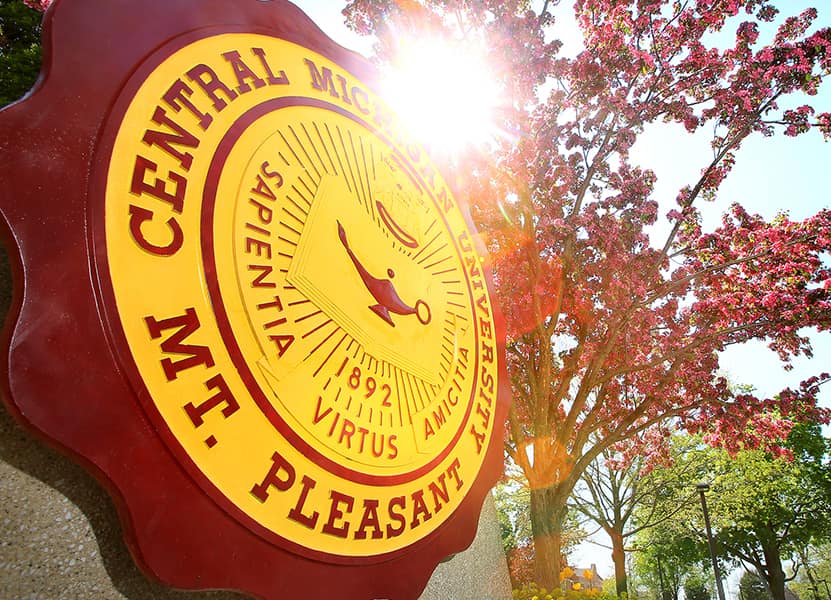Posters collection, 1968, 2006, and undated
8 cubic feet (in 41 Oversized folders)
This is a collection of posters mostly generated by Central Michigan University (CMU)’s Public Relations and Marketing Department. The posters promoted a wide variety of CMU events, departments, offices, speakers, workshops, conferences, etc. The size, color, and composition of the posters vary greatly. The poster designs range from basically enlarged photographs of university buildings, to stark words, to very artistic theatrical posters. Dated posters range 1968-2006, but the majority of the posters are undated. About half of the undated posters have a month and day but no year, for example, “An evening with Muhammad Ali. January 28.”
More than 600 posters are organized into CMU (more than 570) and non-CMU topics (more than 40). Each topic has its own folder. Additional posters have been added periodically so the alphabetical/ numerical order of folder listing is no longer in strict order. For ease of filing, new additions are added to the top of each folder. There are 570 CMU posters and 41 non-CMU posters. In the Folder Listing, the title or Description of the poster, date of poster, and size of poster, in inches, is given. Many posters have multiple dates on them, such as, for example, “Register for Classes, Mon. Dec. 1, 8-5, Tues. Dec. 2, 9-4, Weds…” Any posters that are damaged by rips or holes are also noted.
The collection is ongoing with poster coming from various sources.
Here are the topics of the posters in alphabetical order, which does not follow the folder order because of later, ongoing additions: CMU topics (folders), 570 posters total: Folder 5: CMU Admissions, 26 posters, 1983, 1986-1989, 1991, 1999, and undated; Folder 6: CMU and You Day, 19 posters, 1980-1989, 1991, 1993-1994, 1996-2000; Folder 1: CMU Art Festivals, 4 posters, 1994, and undated; Folder 7: CMU Art Gallery, 5 posters, 1983-1984, 1986-1987, and undated; Folder 8: CMU Artists Course [musicians], 27 posters, 1975, 1979-1980, and undated; Folder 9: CMU Athletics, 20 posters, 1978, 1980-1983, 1986-1988, 1990-1994, and Undated; Folder 2: CMU Beaver Island, 15 posters, 1991-1993, 1998-2003, 2005, and undated; Folder 3: CMU Career Day, 5 posters, 198-1985, 1993, undated; Folder 4: CMU Charles Anspach Platform Series, 7 posters, 1980-1981, 1985, and Undated; Folder 30: CMU Clarke Historical Library, 2 posters, 1985, undated; Folder 20: CMU Conferences / Visiting Artist/ Artist Speakers Course [not musicians], 11 posters, 1976, 1979, 1982-1983, 1988, 1990-1991, and Undated; Folder 21: CMU Departments, 15 posters, 1980-1984, and undated; Folder 10: CMU Development Fund/ Campus Campaigns, 11 posters, 1974-1975, 1983, 1985-1989-1991, 1993, and undated; Folder 23: CMU Faculty Conferences/ Programs, 6 posters, 1980, 1986-1987, 2002, and undated; Folder 24: CMU Film Festivals, 15 posters, 1972, undated [1970s]; Folder 11: CMU Foreign Language Day, 18 posters, 1976-1979, 1981-1984, 1986-1995; Folder 8: CMU Front Row Central, 2 posters, 1995; Folder 25: CMU Graduate Studies/ Extended Degree Programs, 23 posters, undated; Folder 26: CMU Greater Michigan Instructional Materials Exhibits, 13 posters, 1975, 1977-1979, 1981-1982, 1984-1989, 1991; Folder 27: CMU Greek/ Fraternities / Sororities, 7 posters, 1989-1990, and undated; Folder 39: CMU Health Services, 6 posters, undated; Folder 28: CMU IPCD (Institute for Personal and Career Development) Distinguished Lecturer Series, 6 posters, undated; Folder 12: CMU Library, 10 posters, 1991, and undated; Folder 29: CMU Minority Affairs, 9 posters, [1974], 1977, 1982-1983, 1985, 1993, 1995, 2005, and undated; Folder 30: CMU Miscellaneous CMU, 7 posters, 1973, [1976], 1976, 1981, undated; Folder 30: CMU Museum, 5 posters, undated; Folder 31: CMU Musical Performances [no notation they are Artist Course-related], 55 posters, 1972, 1975, 1985-1997, 1999, 2001, and undated; Folder 32: CMU Office of Career Development of Handicapped Persons, 1 poster, 1976; Folder 33: CMU Other Speakers Sponsored by, 9 posters, 1975, 1981-1982, 1988, 1994, 1998, 2000-2001, and undated; Folder 13: CMU Percussion Workshops, 5 posters, 1992-1995, 1998; Folder 14: CMU Program Board/ Speaker Series, 34 posters, 1974-1975, 1977, 1979-1981, 1984-1987, 1989, 1992-1994, 1998-1999, and undated; Folder 34: CMU Racism, 2 posters, undated; Folder 15: CMU Scholarship, 15 posters, 1990-1991, 1993-1995, 1999-2000, 2002, 2004, 2006, and undated; Folder 16: CMU School of Music, 26 posters, 1977-1978, 1980-1981, 1988, 1990-1993, 1995-1997, 2000-2001, 2003-2005, and undated; Folder 35: CMU Sexual Assault/ Sexual Harassment, 9 posters, undated; Folder 17: CMU Student Art Exhibits, 19 posters, 1977-1982, 1984-1985, and Undated; Folder 18: CMU Student Services, 19 posters, 1978-1980, 1983-1984, 1991, 2002, and undated; Folder 36: CMU Study Abroad Poster, 1 poster, undated; Folder 37: CMU Summer Classes/ Programs, 15 posters, 1982-1987, 1989-1992, and Undated; Folder 40: CMU University Theater, 84 posters, 1968, 1971-1972, 1976, 1981-1996, 2003-2005, and undated; Non-CMU topics (folders), 41 posters total: Folder 19: Community Events, 11 posters, 1978, 1981, 1986, 1989, 2005, and undated; Folder 22: Energy/ Conservation, 13 posters, 1978, and undated; Folder 4l: Miscellaneous, 5 posters, undated; Folder 38: Theater (not CMU), 12 posters, 1982-1984, 1986-1988, and undated.
Each folder is described in the following order in the Folder Listing: Poster Description. Date (if given) - size (any remarks)
